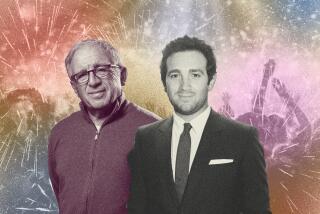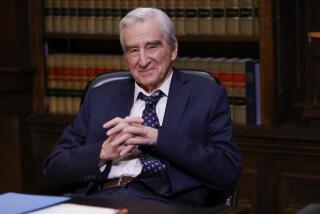Contender Q&A: Kevin Spacey on greed and generosity
- Share via
Reporting from New York — — Kevin Spacey has earned accolades and two Oscars for nailing the nuances of characters who might otherwise seem simply reprehensible. Now he’s upping the ante playing real-life criminal and former lobbyist Jack Abramoff, currently imprisoned for fraud and corruption, in the darkly comedic “Casino Jack.” Directed by George Hickenlooper (“Factory Girl”), who died in his sleep last month at the age of 47, “Casino Jack,” which opens Dec. 17, won praise at the Toronto International Film Festival and is propelling its leading man into award season.
Over a noon breakfast of oatmeal, Spacey, who lives in London, where he is artistic director of the Old Vic Theatre, talked about finding sympathy with the man some call the devil. And about hearing of his director’s untimely death.
How did you hear about George Hickenlooper’s death?
I was sitting at dinner with my producing partner when we got the call. The next hours were the most surreal I’ve experienced in my life. It’s not because people die, but when someone is just 47, and so energetic …
Did you have any hesitation about playing someone who has been painted as a villain?
I thought there was something incredible about being able to play both Ron Klain, who was Al Gore’s chief of staff and an almost heroic Democrat [in HBO’s 2008 “Recount,” which Spacey co-produced and for which he earned Emmy and Golden Globe nominations], and then being able to play Abramoff. All I knew at that point was that he was the most disgraced Republican in Washington. I didn’t understand the complexities.
Which are what?
He did a few things that were crossing the line, but that’s the culture there. Put him in the context of the system, where buying influence is what it’s all about — they’re saying, “I will give you $50,000 if you vote yes or no.” Call me crazy, but that’s quid pro quo usually. So he’s not Bernie Madoff. I mean, yes, there are certainly qualities of misjudgment. I’m not saying he’s a saint. He did some things that people don’t like and some people say were damaging.
You spent weeks researching Abramoff and traveled to Washington to meet people he knew. What’s your sense of where he went wrong?
I think for him it was never enough. The part where you go, “Huh?” was that he was making so much money, but when I was looking for the evidence of his private jet or his extravagant personal things, they don’t exist. It was about the money, yes, but it wasn’t about personal greed. I think it stemmed from the need to prove himself, his need for approval.
You went with Hickenlooper to meet Abramoff in prison. What was that like?
We spent a little more than six hours together. I hadn’t realized how funny he was before I met him. He’s very, very funny, and we traded impressions. But I wasn’t thinking, “I have to take it all in.” I wasn’t doing the movie for him. He likes it or doesn’t like it; that’s not my problem. My job is to tell the story with my director by my side with as much entertainment as possible, so people don’t say, ‘Ugh, it’s like watching a documentary.”
Is it important to have fun?
Oh, God, yes. Making this movie was so much fun. Sometimes we would hear George off camera snorting with laughter. The thing I will miss the most about him is his giggle. I’m just glad that he died knowing that people were embracing the film because that would have made him happier than anything.
More to Read
Only good movies
Get the Indie Focus newsletter, Mark Olsen's weekly guide to the world of cinema.
You may occasionally receive promotional content from the Los Angeles Times.










